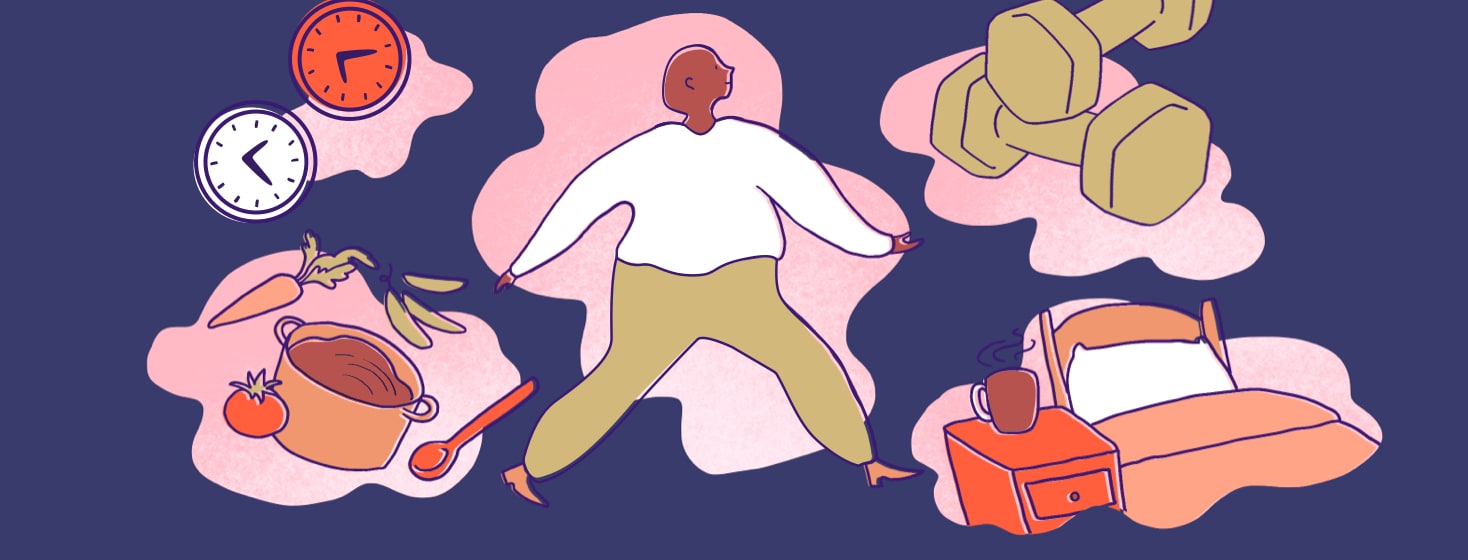Sleep Issues and Obesity
Sleep is an essential part of our daily lives. It allows our bodies to rest, repair, and prepare for the next day. But when we do not get enough sleep, it can have negative effects on our health.1
One big impact is on weight. Research shows there is a strong link between getting too little sleep and obesity. Studies compared people who regularly got less than 7 hours of sleep a night to people who got 7 to 9 hours. The ones who got less than 7 hours were:1-3
- Nearly 2 times more likely to be overweight
- About 1.5 times more likely to have obesity
It is clear that having ongoing (chronic) sleep issues is a risk factor for obesity. Understanding this connection can help us make better choices for our health.1-3
How sleep issues can lead to obesity
Lack of sleep is also known as sleep deprivation. It affects our bodies in many ways, including:1-5
- How the body metabolizes food
- The body’s hunger hormones
- Which foods we crave
- Where the body stores fat
- How much physical activity we get
Poor sleep affects our metabolism
The body’s internal clock is also known as the circadian clock. This clock influences our metabolism in several key ways. Metabolism is the process by which our bodies convert food into energy. When we do not get enough sleep, our circadian clock gets thrown off. This disrupts our metabolism.1,4
Our circadian clock helps regulate hormones. These hormones influence how our bodies process sugars and fats. So, chronic sleep issues can lead the body to not be able to process food as efficiently, leading to more fat buildup.1,3,4
Poor sleep affects our appetite
Sleep plays a big role in regulating hunger hormones. Two important hormones that control appetite and hunger are:1-4
- Ghrelin – increases appetite
- Leptin – tells the brain when we are full
When we are sleep deprived, ghrelin levels rise, making us feel hungrier. At the same time, leptin levels drop, making it harder for us to feel full. This imbalance can lead to overeating and not feeling satisfied, which can cause weight gain, especially around the midsection.1-4
Poor sleep makes us crave unhealthy foods
Lack of sleep and increased ghrelin make us crave high-carbohydrate and high-fat foods. This is because sleep deprivation affects the brain's reward system, making us more likely to seek out foods that are high in sugar and fat. Seeking these foods is also the body’s way of trying to get more energy after not enough sleep.1,3
These foods provide quick energy but are high in calories. Eating too much of this type of food can lead to weight gain.1,3
And when we are tired, we may also skip exercise because we are feeling too exhausted. Over time, these habits can lead to packing on more pounds.1,3
Obesity’s impact on sleep
Just as poor sleep can lead to obesity, obesity can also cause sleep problems. Excess body weight can lead to things like sleep apnea.1,3,5
Sleep apnea is a condition where breathing repeatedly stops and starts during sleep. A person with sleep apnea does not get quality sleep and frequently wakes up during the night. This, in turn, leads to fatigue during the day, further sleep deprivation, and a vicious cycle of poor sleep and weight gain.1,3,5
Other issues related to poor sleep
Poor sleep can also impact other aspects of our health. These things also increase the risk for obesity and include:2-4
- Decreased insulin sensitivity, making a person more at risk for type 2 diabetes
- Increased fat storage in the abdomen
- Increased inflammation
- Poorer quality diet
Ways to improve sleep
Improving your sleep can help you maintain a healthy weight and overall well-being. Here are some ways to help you get better sleep:3
- Stick to a sleep schedule – Go to bed and wake up at the same time every day. This goes for weekends, too. Staying consistent helps regulate your body’s internal clock.
- Create a relaxing bedtime routine – Do calming activities before bed. Try reading a book, taking a warm bath, or doing some deep breathing exercises. Avoid screens and bright lights. They mimic sunlight to the brain and can disrupt your ability to fall asleep.
- Make your sleep environment comfortable – Make your bedroom as quiet, dark, and cool as possible. This helps the body prepare for sleep.
- Watch what you eat and drink before bed – Avoid large meals, caffeine, and alcohol close to bedtime. These interfere with your ability to fall asleep and stay asleep.
- Get regular exercise – Getting physical activity throughout the day can help you fall asleep faster at night. Just avoid intense exercise too close to bedtime.
- Get natural light during the day – Spend time outside or near a window to expose yourself to natural light, especially in the morning. This helps regulate your circadian clock.
- Get medical help if needed – If you continue to struggle with not sleeping despite trying these tips, reach out to your doctor or a sleep specialist. They can help find out what is causing your sleep issues and provide the right treatment.

Join the conversation